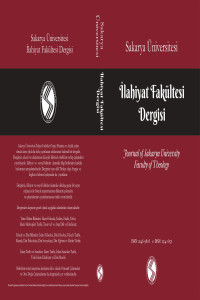Hicri II-IV. Asır Kıraat İhticâcı Uygulamalarının Sonraki Dönem Kıraat İhticâcı Uygulamalarına Etkileri: Neşru’l-Ḳırââti’l-‘Aşr Özelinde Bir İnceleme
The Effects of the Qirāʾāt İḥtijāj Practices of the II-IVth Century of Hijra on the Qirāʾāt İḥtijāj Practices of the Later Period: A Study on Nashr Al-Qirāʾāt al-‘Ashr
Author(s): Mehmet Kılıç, Muhammed PilgirSubject(s): Theology and Religion, Islam studies, Qur’anic studies
Published by: Sakarya üniversitesi
Keywords: Qirāʾāt; Ibn al-Jazarī; Nashr al-Qirāʾāt al-ʿAshr; Iḥtijāj of Qirāʾāt; Maʿānī al-Qurʾān; Maʿānī al-Qirāʾāt;
Summary/Abstract: The concept of iḥtijāj, which means to justify anything, has emerged along with the debates caused by the differences in adāʾ. The concept of iḥtijāj refers to the presentation of the scientific basis for the varieties that arise in the science of qirāʾāt with respect to the qurrāʾ with various arguments. The literature in which iḥtijāj of qirāʾāt were included appeared at the end of the 2nd century of hijra, and in addition iḥtijāj enforcements were also included in the general literature of qirāʾāt. As a matter of fact, the possible delusions that may arise in the minds of the interlocutors due to variant readings of the Qurʾān are intended to be dispelled by the practices iḥtijāj of qirāʾāt, with the aim of clarifying the scientific basis of the relevant of the qirāʾāt variants. In this context, one of the practices in the traditions of maʿānī al-Qurʾān that emerged in the 2nd century of hijra and maʿānī al-qirāʾāt that emerged in the 4th century of hijra is the iḥtijāj of qirāʾāt. Thus, Ibn al-Jazarī, likewise, in his work Nashr al-qirāʾāt al-ʿashr, in which the variants of qirāʾāt are presented, occasionally makes applications of iḥtijāj by justifying the variant readings of the Qurʾān. Although there are studies on iḥtijāj of qirāʾāt among the modern period studies, there are not quite studies on the iḥtijāj practices in Ibn al-Jazarī's Nashr. As a matter of fact, as far as can be ascertained, there is a study titled "en-Neşr Bağlamında İbnü’l-Cezerî’nin Kıraatleri Delillendirme ve Değerlendirme Metodu" conducted by Mehdī Dahīm on the iḥtijâc practices in Ibn al-Jazarī's Nashr. However, in this study, it was observed that let alone the qirāʾāt literature, regarding the iḥtijāj of qirāʾāt, the literature of maʿānī al-Qurʾān and maʿānī al-qirāʾāt were not used, and it was determined that other Islamic disciplines such as tafsīr and Arabic language were not utilized sufficiently. For this reason, we believe that the aforementioned work of Dahīm is insufficient. In this study, the comparison of the qirāʾāt iḥtijāj, which emerged in the context of Ibn al-Jazarī's Nashr, with the maʿānī al-Qurʾān and maʿānī al-qirāʾāt literature has been revealed. From this point of view, this study aims to examine Ibn al-Jazarī's iḥtijāj practices in the context of Nashr al-qirāʾāt al-ʿashr and to investigate the influence of the works belonging to the traditions of maʿānī al-Qurʾān and maʿānī al-qirāʾāt written between the second and fourth centuries of the Hijra on Ibn al-Jazarī's tawjīhs. This study attempts to identify the materials utilized in the iḥticāj of qirāʾāt in Nashr al-qirāʾāt al-ʿashr, and then compares the examples of iḥtijāj in uṣūl and farsh al-ḥurūf chapters of Nashr with the iḥtijāj enforcements of the predecessor scholars/salaf ʿulemā. Furthermore, although this study also draws while the literature of tafsīr and ḥujjat al-qirāʾāt are also consulted, the main focus of this study is on the early examples of Nashr al-qirāʾāt al-ʿashr, maʿānī al-Qurʾān, and maʿānī al-qirāʾāt/ḥujjat al-qirāʾāt. In the first step of the study, the elements utilized in the justification of the variants of qirāʾāt in Nashr are discussed. In the next stage, four samples selected from the uṣūl and farsh al-ḥurūf chapters Nashr were nature in Abū Zakariyyā Yaḥyā b. Ziyād b. ʿAbdillāh al-Farrāʾ's Maʿānī al-Qurʾān, Abū ʿUbayda Maʿmar b. al-Mus̱annā al-Taymī's Majāz al-Qurʾān, Abū al-Ḥasan Saʿīd b. Masʿada alMujāshiʿī al-Balḫī Aḫfash al-Awsaṭ's Maʿānī al-Qurʾān, Abū Jaʿfar Aḥmad b. Muḥammad b. İsmāʿīl al-Murādī al-Naḥḥās' Maʿānī al-Qurʾān al-Karīm, Abū İsḥāq İbrāhīm b. al-Sarī b. Sahl al-Zajjāj's called Maʿānī al-Qurʾān and iʿrābuhū early period maʿānī al-Qurʾān works, and Abū Manṣūr Muḥammad b. Ahmad al-Azharī's Kitāb Maʿānī al-qirāʾāt and Abū ʿAbdillāh al-Ḥusayn b. Ahmad b. Ḫālawayh al-Hamadānī's called al-Ḥujja fī al-qirāʾāt al-sabʿ, maʿānī al-qirāʾāt works has been compared. Thus, it was examined whether the iḥtijāj practice in these works affected the iḥtijāj practices in Nashr. As a result of the study, it is to be observed that in Nashr al-qirāʾāt al-ʿashr, the variant readings of qirāʾāt are based on the Arabic language, rasm al-muṣḥaf, tafsīr, etc. In addition, it has been found that some of the qirāʾāt tawjīhs made in Nashr were mostly not mentioned in the writings of maʿānī al-Qurʾān and maʿānī al-qirāʾāt written in these three centuries. It was found that some of the examples of iḥtijāj practices in the work in question were not included in the works of maʿānī al-Qurʾān and maʿānī al-qirāʾāt written in the 2nd–4th centuries of Hijra, and some of them were generally not mentioned by the authors in terms of iḥtijāj. While in the works belonging to these literature Abū ʿUbayda al-Taymī and al-Azharī did not include the relevant examples, Neḥḥās and Aḫfash al-Awsaṭ refer to the discipline of iḥtijāj in one example, and Zajjāj and al-Farrāʾ in two examples. As a result, it has been understood that the data obtained in the works utilized in the comparison of iḥtijāj and the practices made in Nashr are similar. Another point is that the data related to the subject in the commentary works referenced in the research are similar to those in Nashr. In addition, Ibn al-Jazarī made the tawjīh of qirāʾāt in the 156th verse of the Sūrat Āl ʿImrān, where there is no qirāʾāt variant, and in the compared works, it has not been found a presumption that has justified the of the relevant word in the 156th verse of the Sūrat Āl ʿImrān
Journal: Sakarya Üniversitesi İlahiyat Fakültesi Dergisi (SAUIFD)
- Issue Year: 26/2024
- Issue No: 49
- Page Range: 327-352
- Page Count: 26
- Language: Turkish

